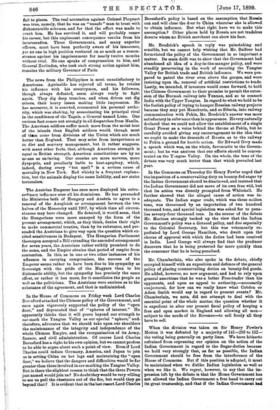Mr. Brodrick's speech in reply was painstaking and sensible, but
we cannot help wishing that Mr. Balfour had formulated the policy of the Government in so important a matter. Its main drift was to show that the Government had abandoned all idea of a dog-in-the-manger policy, and were steadily persevering in the work of securing the Yangtse Valley for British trade and British influence. We were pre- pared to patrol the river even above the gorges, and were insisting upon th,, removal of artificial restrictions to trade. Lastly, we intended, if investors would come forward, to hold the Chinese Government to their promise to permit the exten- sion of the Barmah railway into Yunnan, and so to connect India with the Upper Yangtse. In regard to what we hold to be the foolish policy of trying to hamper Russian railway projects because they may put Manchuria, and so Siberia, into railway communication with Pekin, Mr. Brodrick's answer was more satisfactory in substance than in appearance. He very naturally declared that we could not allow the establishment of a single Great Power as a voice behind the throne at Pekin, but he carefully avoided giving any encouragement to the idea that we ought to make the demands of Russia as to the railway to Pekin a ground for hostile action. Sir Edward Grey made a speech which was, on the whole, favourable to the Govern- ment; but he was anxious that our efforts should be concen- trated on the Yangtse Valley. On the whole, the tone of the debate was very much better than that which prevailed last year.






































 Previous page
Previous page